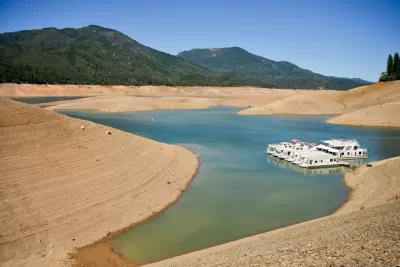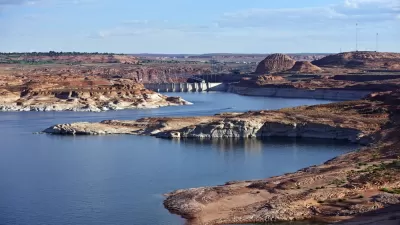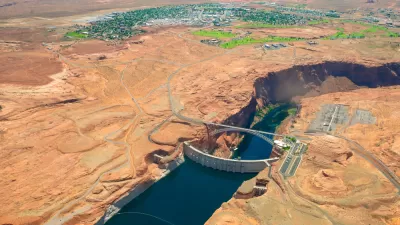Jeff Kightlinger, general manager of the Metropolitan Water District of Southern California, explains how the impacts of California’s historic drought are already changing the landscape of the American Southwest.

The largest water supplier in Southern California, Metropolitan Water District, oversees 19 million people, 14 cities, 11 water districts, and one county water authority. In the recent historic drought, the Metropolitan Water District (MWD) has made news for establishing the largest water conservation rebate program in the history of country: roughly $450 million in a two-year period with $350 million going to turf rebates and $100 million going to water-efficient home appliances. Going forward, MWD is looking to find even more creative solutions to conserving water and ensuring a sustainable future in Southern California.
General Manager Jeff Kightlinger joined The Planning Report to discuss how climate change impacts on California's water supply are requiring MWD to prioritize differently and move forward with zero expectations of available water.
As Kightlinger puts it simply: "climate change is very real, and we believe we are already seeing the impacts on our water supply." He explains how just the change to getting more rain and less snow can "alone can change everything from when water is available, to how we have to move it, to the best infrastructure for the job."
Kightlinger, a Governor’s appointee to the California’s Bay Delta Vision Blue Ribbon Task Force, also sheds light on MWD challenges and progress to restore habitat and increase biodiversity in the Sacramento-San Joaquin Delta. Finally, Kightlinger explains how MWD is engaging in ongoing discussions on the Colorado River, which is often referred to as the “lifeblood of the American Southwest including Mexico." The Colorado River has been in drought for the last 16 years, and Kightlinger explains that all stakeholders are all going to have to reduce our annual demands on the Colorado River. Kightlinger explains that California, Nevada, and Arizona, which make up the river’s Lower Basin, are "working on contingency plans to develop cooperative inter-state programs that will help each state mitigate and cope with the effects of the drought."
Read more about the future of Southern California's drought strategy in The Planning Report.
FULL STORY: Climate Change Impacts on California's Water Supply Require MWD to Prioritize Differently

Alabama: Trump Terminates Settlements for Black Communities Harmed By Raw Sewage
Trump deemed the landmark civil rights agreement “illegal DEI and environmental justice policy.”

Study: Maui’s Plan to Convert Vacation Rentals to Long-Term Housing Could Cause Nearly $1 Billion Economic Loss
The plan would reduce visitor accommodation by 25% resulting in 1,900 jobs lost.

Planetizen Federal Action Tracker
A weekly monitor of how Trump’s orders and actions are impacting planners and planning in America.

Wind Energy on the Rise Despite Federal Policy Reversal
The Trump administration is revoking federal support for renewable energy, but demand for new projects continues unabated.

Passengers Flock to Caltrain After Electrification
The new electric trains are running faster and more reliably, leading to strong ridership growth on the Bay Area rail system.

Texas Churches Rally Behind ‘Yes in God’s Back Yard’ Legislation
Religious leaders want the state to reduce zoning regulations to streamline leasing church-owned land to housing developers.
Urban Design for Planners 1: Software Tools
This six-course series explores essential urban design concepts using open source software and equips planners with the tools they need to participate fully in the urban design process.
Planning for Universal Design
Learn the tools for implementing Universal Design in planning regulations.
Caltrans
Smith Gee Studio
Institute for Housing and Urban Development Studies (IHS)
City of Grandview
Harvard GSD Executive Education
Toledo-Lucas County Plan Commissions
Salt Lake City
NYU Wagner Graduate School of Public Service




























